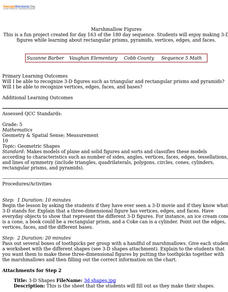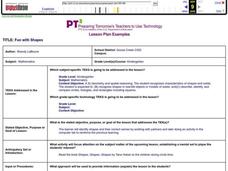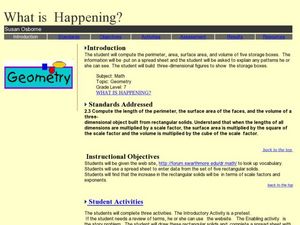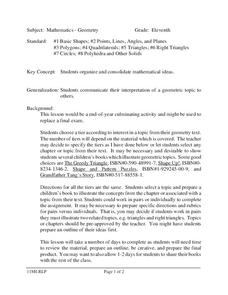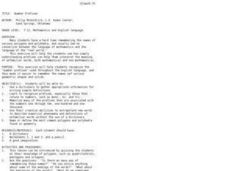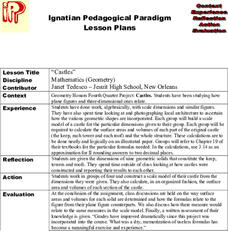Shodor Education Foundation
Sets and the Venn Diagram (Beginner)
Venn diagrams are helpful in understanding the idea of a set and using attributes to sort items. This basic plan is an introduction with an added bonus of an applet that can be used to demonstrate the activity. If a classroom of...
Curated OER
Guess My Shape
Learners play a game with shapes. They work in groups to identify the names and characteristics of various shapes. They give each other clues to see if others can identify the shape being described. This is a great hands on activity.
Shodor Education Foundation
Pythagorean Theorem
Most adults remember learning about the Pythagorean theorem, but they don't all remember how to use it. The emphasis here is on developing an intuitive understanding of how and when to use the theorem. Young mathematicians explore...
Curated OER
Marshmallow Figures
Students enjoy making 3-D figures while learning about rectangular prisms, pyramids, vertices, edges, and faces. After a lecture/demo, students use marshmallows, toothpicks and a worksheet imbedded in this lesson to create 3 dimensional...
Curated OER
Fun with Shapes
Young mathematicians identify shapes and their correct names. They work with partners using various manipulatives and computer software to reinforce the concept. I really like these lesson plans. They are well-designed, the procedures...
Curated OER
Supplementary, Complementary, and Vertical Angles
By using circles that they cut out and label themselves, learners literally "get a grip" on the angles they identify: supplementary, complementary, and vertical. They solve missing measurements based on properties of supplementary,...
Curated OER
What is Happening?
Review area, perimeter and volume using this lesson. After reviewing key vocabulary relating to these concepts and answering story problems, learners compute the perimeter, area, surface area, and volume of five storage boxes.
Curated OER
Foil Fun
Second graders be having hands-on experiences with three-dimensional solid shapes. They investigate the features of solid shapes and examine the names for them. They are introduced to making nets for 3D shapes.
Curated OER
NUMB3RS Activity: Regular Ploygon Centroids
Young scholars investigate geo-profiling. In this secondary mathematics lesson plan, students use geo-profiling to determine the most probable location of a criminal. Young scholars find the centroid of a polygon where the vertices...
Curated OER
Basic Shapes
Students create books about shapes. In this shape lesson, students select a topic such as points, lines, angles, planes, polygons, quadrilaterals, triangles, circles, and polyhedra. In groups, they create an illustrated children's book...
Curated OER
Number Prefixes
Students recognize the number prefixes used throughout the English language. They identify the shapes and the prefixes that are associated with them.
Curated OER
Volume and Surface Area
In this volume and surface area activity, 10th graders solve and complete 12 different types of problems. First, they find the volume of an isosceles trapezoid. Then, students find the volume and total surface area of a sphere. They also...
Curated OER
Shapes
In this geometry worksheet, students analyze 9 drawings of geometric shapes and solid figures. Students write the name of each shape. There is no word bank.
Curated OER
Children's Museum of Houston - Pre/Post Classroom Activities - Nets
Young scholars make three dimensional shapes with nets. In this nets lesson, students receive nets which they fold to make a three dimensional object. They predict what shape each net will make and verify it after making the net. They...
Curated OER
Pythagorean Theorem
For this measurement lesson, learners examine the Pythagorean Theorem, perimeter, and areas of right triangles. They record their measurements and research their findings on a grid.
Curated OER
Measurement
Pupils create two prisms out of the same paper. They calcuate the number of centimeter cubes needed to fill each prism. They discover the concept of volume.
Curated OER
Exploring Similarity Using Scale Drawings
Learners explore scale factor as they create a scale drawing of a box, then determine the surface area and volume of the original and the scale drawing. The one page worksheet contains activities and procedures with four questions.
Curated OER
Volume Worksheet I
For this volume worksheet, students recognize three-dimensional figures, identify the proper volume formula, and then solve the equation by inserting information from a diagram into the formula. Students solve six equations.
Curated OER
3-D Figures Part 1
Elementary schoolers explore 3-D shapes. They transition from thinking of shapes as only 2-D. Pupils read Cinderella as a launching activity for their upcoming adventure, and explore a new world of 3-D shapes in this introductory lesson.
Curated OER
Faces of a Cube
Students identify and correctly name three-dimensional solids; cones, spheres, and cubes. In this three-dimensional figures lesson, students build a cube by matching colored square faces to a correct word. Students then explore...
Curated OER
Castles
Students create a scale model to a castle using the dimensions they were given. They calculate the surface areas and volumes of each section of their castle.
Curated OER
Color Me Square
Second graders identify and describe basic geometric solids. Working as a class, 2nd graders describe geometric solids using the proper vocabulary and counting faces, bases, corners, and edges. In pairs, students use a computer drawing...
Curated OER
Odd Thing Out
Students listen to the math problem provided and work in groups to solve. They think about the objects and write down their information in a table. Class construct the table on a large piece of paper that can be put on the wall after the...
Curated OER
Houses
Third graders use a number of problem solving strategies in this unit of lessons. They determine how to draw and model three-dimensional objects, use co-ordinate systems, determine probability of events, and identify paths of simple...





